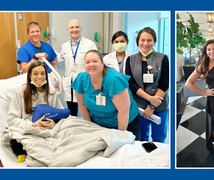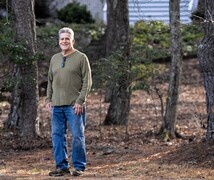Sydney McCann was back to playing volleyball two weeks after Duke neurosurgeon Ali Zomorodi, MD, used an endoscope to reach and remove a pituitary tumor that was pressing on her pituitary gland and causing her to lose her vision. Her mom, Michelle says, “I’m a Carolina fan, but we owe Duke our life."
Sydney McCann had just eaten dinner when the peripheral vision in her left eye went dark. “It was almost like a black shadow,” says the 16-year-old athlete from Graham, NC. “It was completely black. I was really scared of what it could be.”
“I felt a sense of peace when I met Dr. Zomorodi,” Michelle said. “That was where we needed to be.”
A Tumor was Pressing on Sydney's Optic Nerve
Sydney was right to be concerned. After a trip to her eye doctor and an MRI, she was diagnosed with a non-cancerous tumor on her pituitary gland. “The tumor was sitting on my optic nerve, and was blocking my vision,” she said.
Sydney’s eye doctor referred her to Duke, but because the health system was out of network, Sydney and her parents took her test results to a surgeon in their health insurance network instead. They were dumbfounded when he said he wouldn’t operate because he couldn’t see the tumor.
“Can you imagine your little girl going blind and being told there’s nothing we can do?” Michelle recalls, still frustrated. “How could two neuro radiologists and two ophthalmologists see the tumor and he couldn’t? He wanted us to go through all the tests again. The tumor had started pressing on her right eye. Sydney was losing her vision quickly. We didn’t have time.”
Michelle followed the eye doctor’s first referral and made an appointment for Sydney with Duke neurosurgeon Ali Zomordi, MD. “I felt a sense of peace when I met Dr. Zomorodi,” Michelle said. “That was where we needed to be.”
“When I signed up for my insurance policy, I never thought we’d have to make the choice to go somewhere else. When we were faced with the decision, we knew it didn’t matter if we had to pay for the rest of our life, we’ll do what we have to do."
Endoscopic Approach Quickens Recovery
An enlarged pituitary gland, the observation made by the first surgeon, is not uncommon in girls her age, says Zomorodi. However, it wasn’t normal for the gland to be putting such pressure on Sydney’s optic nerve. “After reviewing the scan, I could see a lesion on her pituitary gland was responsible,” he said.
Surgery at Duke Raleigh Hospital was scheduled for the following week, on Sydney’s first day of her junior year in high school.
There are two ways to access a pituitary gland tumor. One way is to split the nasal septum that separates the right and left nostril, and use microsurgical techniques to reach the tumor.
Zomorodi used an endoscope, a lighted tube with a camera on its end that was inserted into Sydney’s nose. “We put the camera right down into the pituitary gland,” he explained. “There are no blind corners.”
The endoscopic approach requires a team of specialists with advanced training and expertise. Zomorodi uses it exclusively for pituitary tumors because it’s less traumatic. “We don’t have to split the septum of their nose.” This helps patients recover faster.
Back to Playing Volleyball, Back to Normal
Sydney, who woke up after surgery with her eyesight fully restored and no physical scars, can attest to that. Although she suffered headaches following surgery due to hormonal changes during the healing process, she was back to school, and playing volleyball two short weeks later. I played the day I got released,” she said. “I’m back to normal.”
While Michelle hopes her insurance company will agree to pay for the procedure considering the first, in network opinion they received, she says she has also learned a valuable lesson. “When I signed up for my insurance policy, I never thought we’d have to make the choice to go somewhere else. When we were faced with the decision, we knew it didn’t matter if we had to pay for the rest of our life, we’ll do what we have to do.
“Now we’ll change our insurance so Duke will be in network,” Michelle says. “I’m a Carolina fan, but we owe Duke our life.”





